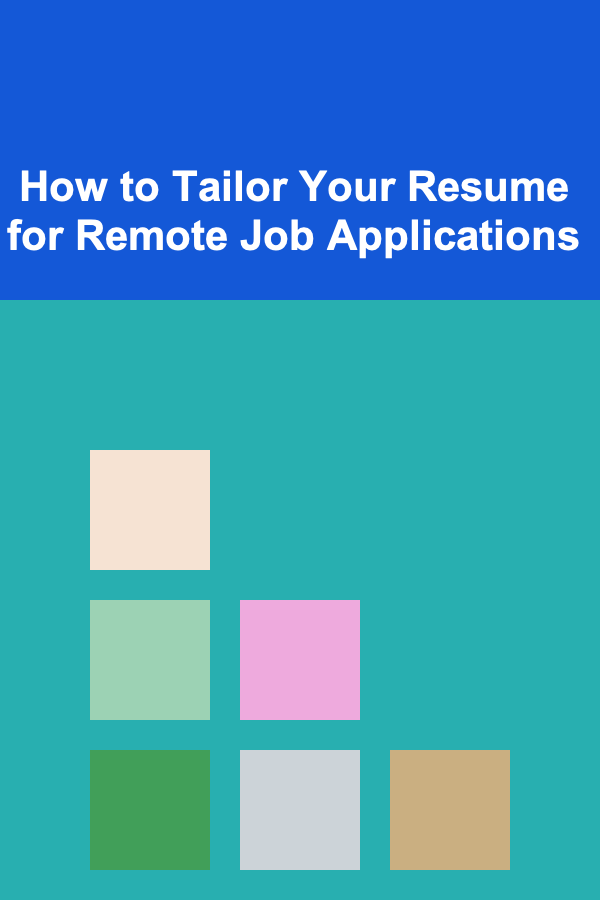
How to Tailor Your Resume for Remote Job Applications
ebook include PDF & Audio bundle (Micro Guide)
$12.99$10.99
Limited Time Offer! Order within the next:

The shift towards remote work has created a whole new dynamic in the job market. Employers are now seeking individuals who not only possess the right skill set but also have the right mindset to succeed in a remote environment. With this in mind, tailoring your resume specifically for remote job applications has become essential. A generic resume that works for in-person jobs might not be enough to stand out in the increasingly competitive remote job market.
In this guide, we'll explore how to effectively tailor your resume for remote job applications, highlighting key areas of focus and strategies that will make your resume more appealing to remote employers.
Emphasize Remote-Related Skills
A. Self-Discipline and Time Management
Remote work requires a high level of self-discipline and time management. Employers are often looking for candidates who can work independently and stay focused without direct supervision. In your resume, mention your ability to manage multiple tasks and projects, prioritize effectively, and meet deadlines without constant oversight.
Example:
- "Effectively managed a diverse set of projects with tight deadlines, ensuring timely delivery without direct supervision."
- "Proven ability to stay organized and prioritize tasks in a remote work environment, ensuring consistent productivity."
B. Communication Skills
Effective communication is at the heart of remote work, as teams may be spread across different time zones and cultures. Highlight your experience in using communication tools like Slack, Zoom, Microsoft Teams, and email. Employers want to know that you can communicate clearly, both written and verbally, and that you're comfortable with virtual meetings and asynchronous communication.
Example:
- "Regularly communicated with a distributed team using Slack, email, and Zoom, ensuring alignment across all projects."
- "Clear and concise written communication skills, maintaining transparency and reducing misunderstandings in remote settings."
C. Tech-Savviness
Remote jobs often require you to use a variety of online tools and platforms for collaboration, project management, and workflow optimization. Employers value candidates who are comfortable with digital tools. If you're proficient in project management software (Trello, Asana, Monday.com), cloud-based file sharing (Google Drive, Dropbox), or customer relationship management (CRM) systems, make sure to list these skills prominently on your resume.
Example:
- "Proficient in project management tools (Trello, Asana) to track tasks, deadlines, and team collaboration in remote environments."
- "Experienced in using cloud-based document sharing platforms (Google Drive, Dropbox) for seamless team collaboration."
D. Adaptability and Problem Solving
Working remotely often comes with unexpected challenges, such as technical difficulties or communication barriers. Employers want individuals who are adaptable and can think critically to solve problems without needing much assistance. Showcase examples from your past roles where you've had to solve problems independently.
Example:
- "Adapted quickly to new remote work tools and methodologies, optimizing team workflows and improving efficiency."
- "Resolved technical challenges independently, ensuring minimal disruption to team productivity in a remote work setting."
Highlight Remote Work Experience (if Applicable)
A. Previous Remote Roles
If you've worked remotely before, make sure this experience is front and center on your resume. Clearly state the remote nature of your job in your job descriptions, and highlight any achievements or responsibilities that are specific to remote work. Employers will be more likely to trust candidates who have demonstrated the ability to work effectively in a virtual environment.
Example:
- "Remote Content Manager (2021-Present) | XYZ Company"
- Managed a team of 5 content writers remotely, organizing daily check-ins and feedback loops via Slack and Zoom.
- Increased website traffic by 30% through strategic SEO implementation, all while working remotely.
B. Freelance or Contract Remote Work
If you've freelanced or worked on contract in a remote capacity, list these experiences as well. Even if the role wasn't permanent, it shows your ability to manage your own schedule, meet deadlines, and produce results in a remote environment.
Example:
- Freelance Web Developer (2020-2023)
- Collaborated with clients remotely to design and implement custom websites using WordPress and Shopify.
- Maintained communication through email, video calls, and project management tools to meet project milestones.
Tailor Your Resume to the Job Description
Each remote job will have its own set of requirements, and it's essential to tailor your resume for each application. Highlight the skills and experience most relevant to the specific role you're applying for. Focus on the keywords in the job description and adjust your resume to align with the job requirements.
A. Use Keywords from the Job Listing
Most companies use Applicant Tracking Systems (ATS) to screen resumes before they're even seen by a hiring manager. To pass this initial screening, ensure that your resume includes the keywords and phrases used in the job description. For instance, if the job description mentions "remote collaboration," "cross-functional teams," or "self-starter," incorporate these keywords into your resume to increase your chances of being noticed.
Example:
- "Collaborated effectively with cross-functional teams in a remote environment to deliver high-impact marketing campaigns."
B. Showcase Your Ability to Meet Remote Work Expectations
Some remote jobs will emphasize specific qualities, such as the ability to work independently or in teams, or the ability to handle fluctuating workloads. Tailor your experience to address these expectations by using examples that showcase how you've met similar challenges in past roles.
Example:
- "Successfully managed high-priority tasks in a fast-paced remote environment, consistently meeting deadlines despite fluctuating workloads."
Focus on Results and Achievements
Remote employers often place a significant emphasis on outcomes rather than the hours you spend at a desk. They want to see that you can produce high-quality results from anywhere. Whenever possible, include specific achievements that demonstrate how your remote work has led to measurable success.
A. Quantify Your Achievements
Use numbers to quantify your accomplishments. This will help demonstrate your impact and show that you are results-oriented. Whether it's increasing sales, improving customer satisfaction, or achieving project milestones, concrete numbers make a strong case.
Example:
- "Reduced customer response time by 40% through the implementation of a remote customer service system, improving overall satisfaction."
- "Led a team of 10 remote employees to increase project delivery efficiency by 25%."
B. Focus on the Skills That Matter for Remote Work
Remote employers look for candidates who can manage tasks, communicate effectively, and collaborate with others from a distance. Highlight experiences where you've demonstrated leadership, problem-solving, and team coordination, even if that team was virtual.
Example:
- "Led virtual brainstorming sessions and project planning meetings, resulting in a 15% increase in project efficiency."
- "Coordinated remote team efforts, successfully launching a product within a compressed timeline, increasing market share by 20%."
Showcase Your Personal Traits and Work Ethic
Employers often want to know more than just your technical skills---they also want to see your work ethic and personality. Remote jobs require people who are self-motivated, proactive, and able to maintain focus without direct supervision. Be sure to emphasize personal traits that make you well-suited for remote work.
A. Be Proactive
In remote jobs, being proactive is key. Employers want individuals who can take the initiative, whether it's solving problems, improving processes, or taking on new tasks. Mention examples where you went beyond your usual responsibilities to help the team or company.
Example:
- "Proactively identified areas for improvement in team workflow, implementing new tools that increased overall efficiency by 20%."
B. Demonstrate Accountability
Show that you are responsible and can be trusted to complete tasks without direct supervision. This is especially important in remote work, where you might not have the same level of oversight as in an office environment.
Example:
- "Took full ownership of key projects from start to finish, ensuring timely and successful delivery while working remotely."
Include a Remote-Ready Work Environment
If applicable, mention the fact that you have a dedicated remote work environment. This can reassure potential employers that you have the necessary infrastructure in place to be productive. While this isn't a must for all remote jobs, some employers might appreciate knowing that you are set up for remote work from the get-go.
Example:
- "Equipped with a home office including dual monitors, high-speed internet, and a quiet, distraction-free workspace to ensure maximum productivity."
Conclusion
Tailoring your resume for remote job applications requires more than just changing the job title. It involves emphasizing your remote-specific skills, highlighting relevant remote work experience, and adapting your resume to meet the unique demands of working from home. By focusing on self-discipline, communication skills, adaptability, and quantifiable achievements, you can increase your chances of standing out in the competitive remote job market.
Remember, remote employers want candidates who can excel in a flexible, autonomous environment. Make sure your resume reflects that you not only have the technical expertise but also the mindset and personal traits that will make you a valuable addition to their remote team.

How to Create an Efficient Laundry Room Organization System
Read More
How to Get Feedback on Your Staging Before Listing
Read More
How to Keep Your Home Clean and Tidy with Kids Around
Read More
How to Sell Deep Learning Models and Make Money Online
Read More
How to Sell Digital Products Successfully for Software Developers
Read More
How to Stage Your Home After a Renovation for Maximum Impact
Read MoreOther Products

How to Create an Efficient Laundry Room Organization System
Read More
How to Get Feedback on Your Staging Before Listing
Read More
How to Keep Your Home Clean and Tidy with Kids Around
Read More
How to Sell Deep Learning Models and Make Money Online
Read More
How to Sell Digital Products Successfully for Software Developers
Read More